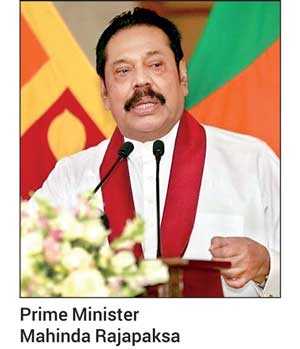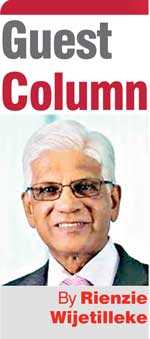Thursday Feb 19, 2026
Thursday Feb 19, 2026
Tuesday, 23 June 2020 00:53 - - {{hitsCtrl.values.hits}}
The Parliamentary Elections to be held this year are critical for the country’s future. Currently Sri Lanka stands on the brink of a budgetary crisis, debt-repayment crisis, economic slowdown beginning in mid-2018 with currency depreciations and exacerbated by the 2019 Easter attacks and now with the lockdowns resulting from COVID-19.
The next Parliament and Cabinet will have to adopt a range of measures and those assigned to implement the program will need to be carefully selected with progress measured regularly. This will need to be in line with the mandate achieved by the President’s party manifesto. 
The current Prime Minister, Mahinda Rajapaksa, has thus far shown his political thinking and shrewdness in the absence of a vibrant Opposition during this time. As usual, the PM is thinking far ahead with his political
calculations.
The previous regime under former PM Ranil Wickremesinghe was a failure overall. Despite sound fiscal policy, the remainder of the record of the previous regime was dismal. Unfortunately, RW has led the party, and the country, on the road to nowhere for the past 25 years.
On the other hand, the current Prime Minister Mahinda Rajapaksa has a proven record of consolidating political capital and using this to further the administration’s agenda. Given the current state of politics in this country, the current PM appears to be the best placed to manage the country during this upcoming period.
The fact that there is no cohesion in any of the other political parties is a major problem in the country. Those of us who have always stated that a strong Opposition is necessary for a country’s governance, have been left utterly disappointed by the leadership of both the UNP and the newly-formed SJB. 
The leaders of both the UNP and the SJB have been unable to find a compromise and work together. The Grand Old Party of Sri Lanka is now simply a skeleton of its former self; devoid of ideas and inspiration and lacking any characters that have any significant record of reform. The Leader of the UNP has shown time and time again, his inability to put plans into action. The challengers within the UNP have been unable to bring sufficient pressure on the leader, and the small group of people around him, to give way to the youth of the party.
The Leader of the SJB has also been unable to wrestle the party from the Leader and the seniors, which does not bode well for his chances at ballot box. An inability to defeat members of his own party is a significant weakness when trying to topple a rival party whose President secured a sizable majority and mandate.
The leftist parties, including the JVP, appear to be not just ideologically bankrupt, but also unable to turn strong rhetoric into substantial voter turnout. So it stands to reason that only one party and one leader can, at this moment, have any chance of leading this country with a strong consensus and an overwhelming mandate.
The country cannot wait for the infighting, disorder and power struggles within the UNP/SJB faction to subside. The people have been watching the political dramas of previous years from the infamous hopper meal, to the mess of the Yahapalanaya regime and the criminality of the bond scam. Sri Lanka must begin the painstaking process of rebuilding as soon as possible, as the country cannot afford another three-quarters of virtual paralysis.
People expect the PM to form a strong team of professionals who can deliver clear, well-thought out and practical policies and solutions for the country and not simply fall in to the usual borrow and spend mentality. Hard decisions will need to be made, and as the PM had done during the war, my hope is that with a new team and fresh faces around him, Mahinda Rajapaksa can write yet another significant chapter in this country’s history.